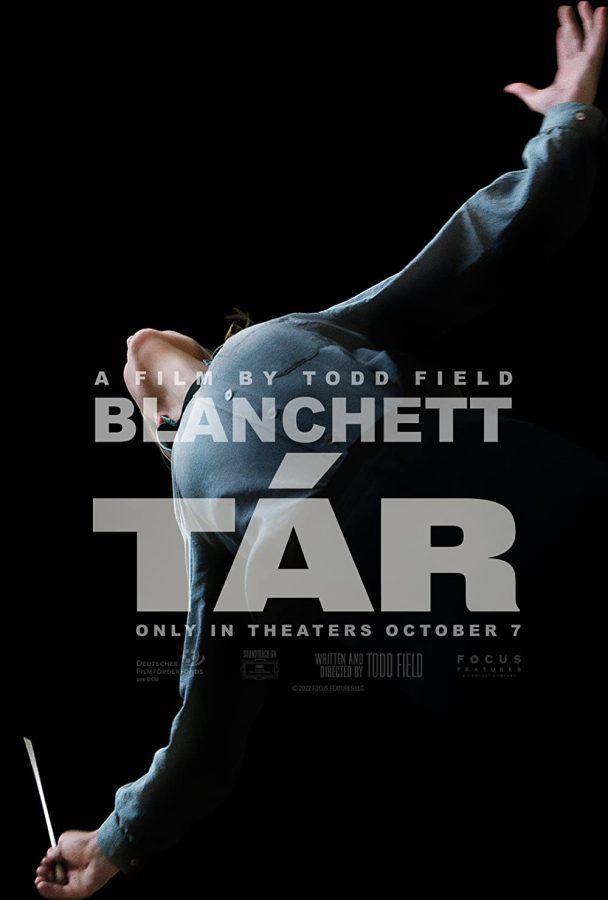Deconstructing Genius in ‘Tár’
Todd Field’s ‘cancel culture’ drama pulls back the curtain on celebrity worship
COURTESY OF FOCUS FEATURES VIA WIKIMEDIA COMMONS
Tár is about the cult of genius, the veneration of artists and the idolatry of regular, flawed human beings.
October 18, 2022
Lydia Tár (Cate Blanchett) is a legend — an EGOT-winning (Emmy, Grammy, Oscar and Tony) composer and conductor who, as detailed in her soon-to-be-published autobiography, “Tár on Tár,” began her career with the Cleveland Philharmonic Orchestra before making her way to Berlin where, when we meet her in the film, she is preparing a performance of Gustav Mahler’s notorious Symphony No. 5.
Like all icons, her life and legacy are complicated. While teaching a class at The Juilliard School, Lydia mocks a student for declaring that they’re “not into” Bach due to his misogynistic personal views. Although Lydia — a self-described “U-Haul Lesbian” — does not necessarily disagree with the student’s moral perspective, she finds it blasphemous that a student of music, one who has dedicated their life to its study and performance, could entirely write off one of the medium’s pioneers.
Herein lies the central question of Todd Field’s “Tár,” which is currently in limited release, playing select theaters in New York City and Los Angeles before entering wide release on Oct. 28: At risk of sounding clichéd, can the art be separated from the artist?
The film has been branded as mainly being about “cancel culture,” as Lydia finds herself at the center of an online controversy consisting of sexual misconduct allegations and a spliced-up video of her aforementioned Bach-induced rant. But, to me, it’s about more than that: It’s about the cult of genius, the veneration of artists and the idolatry of regular, flawed human beings.
When Kanye West goes on Tucker Carlson to slut-shame his ex-wife and push his anti-Black rhetoric, why do people feel compelled to pretend that “The College Dropout” isn’t one of the best albums of all time? Does Harry Styles’ queerbaiting make “Late Night Talking” any less catchy? I hadn’t thought of The Try Guys since 2012, but if you like their videos, why should it matter that Ned cheated on his wife?
The question is not if the claims are true or if she will be held accountable for her actions in the event that they are. Instead, Field poses the question: Does it matter?
This point isn’t to say that any of their behavior is acceptable or excusable, and Field does not excuse or minimize the harm that Lydia has caused to the people around her. On the contrary, some of the most emotional moments of the film come by way of Lydia’s assistant, Francesca (Noémie Merlant),, and her wife, Sharon (Nina Hoss), being caught in the crossfire of the protagonist’s devotion to her craft.
Nevertheless, within the fictional world of “Tár,” Field questions whether Lydia Tár can be one of the greatest conductors of all time, a raging narcissist, devoted mother, terrible partner and serial predator — all at once. Because the film is entirely told from Lydia’s perspective, though, the veracity (or lack thereof) of those traits is never totally defined. As such, the audience is able to explore the nuances of so-called “cancel culture” without having the judgment given to them.
In the hands of any other actor, the complexities that Field wrote within Lydia would have likely been fumbled — but, luckily, he wrote the role for Blanchett. The two-time Oscar winner delivers one of her best performances yet, effortlessly capturing both Lydia’s commanding nature and strong authority.
Blanchett’s portrayal of Lydia is particularly enigmatic. With such a strong presence, it’s difficult to not feel drawn to her in spite of her actions. Several long, winding scenes are scattered throughout the movie, with Lydia pontificating on art, life, music and fame. Blanchett delivers these scenes with voracity, filling minutes upon minutes of dialogue with intrigue and captivating the audience without lapse. Even scenes without dialogue keep the audience’s eyes glued to the screen.
Her beguiling performance ironically mirrors the cult of genius that surrounds Lydia and on which “Tár” comments, as the audience’s focus remains solely on the individual over the collective. While Merlant, Hoss and Mark Strong deliver stellar performances as Lydia’s assistant, wife and colleague, respectively, the focus is always on Blanchett.
It would not be accurate to call “Tár” simply an anti-cancel-culture film. Rather, it is a tightly constructed character study of an artist whose intense commitment to her art becomes overshadowed by her celebrity status. The question is not if the claims are true or if she will be held accountable for her actions in the event that they are. Instead, Field poses the question: Does it matter?














